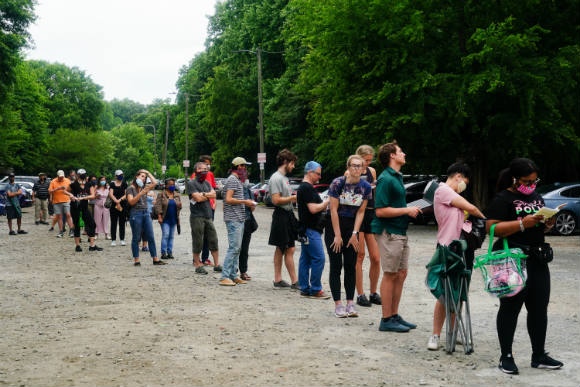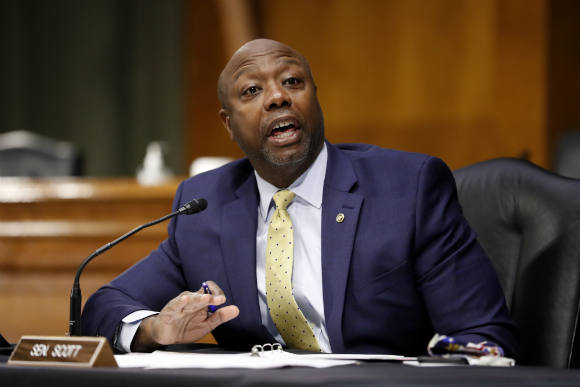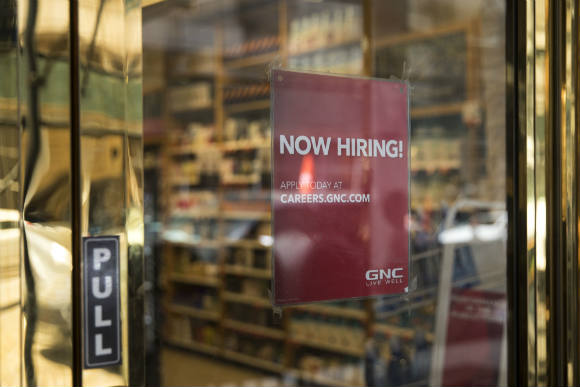The Hill’s Morning Report – Trump’s public standing sags after Floyd protests
Welcome to The Hill’s Morning Report. It is Wednesday. We get you up to speed on the most important developments in politics and policy, plus trends to watch. Alexis Simendinger and Al Weaver are the daily co-creators, so find us @asimendinger and @alweaver22 on Twitter and recommend the Morning Report to your friends. CLICK HERE to subscribe!
Total U.S. coronavirus deaths reported each morning this week: Monday 110,514. Tuesday, 111,007. Wednesday, 112,006.
President Trump has taken a hit to his political standing and is struggling to rebound after a number of damaging responses following the death of George Floyd and weeks of protests that have consumed the nation.
On Tuesday, as many mourned during Floyd’s funeral in Houston, Trump continued to labor in his response to the demonstrations as he lobbed another unfounded accusation on Twitter — that a 75-year-old protester in Buffalo, N.Y., who was shoved and injured by police last week “could be an ANTIFA provocateur.”
More broadly, Trump has been unable to offer a unifying or consistent message at a time of national strife. As Brett Samuels and Morgan Chalfant write, the president’s rhetoric has been out of step with public polling, which shows the majority of Americans are more bothered by the actions of police in the case of Floyd — who was killed after an officer held a knee to his neck for nearly nine minutes — than those of protesters responding to police brutality.
Trump, ever mindful of the latest polls, has seen his numbers slip over the past week as former Vice President Joe Biden has taken a commanding lead in some key states on the 2020 map. According to a poll over the weekend, Biden has doubled his lead in Michigan, holding a 12-point advantage in the battleground state.
“The President’s penchant for trafficking in conspiracy theories is, politically speaking, going to ruin him,” said Ari Fleischer, a press secretary for former President George W. Bush, in response to the president’s comments. “This is reckless. He doesn’t know when to stop.”
On Capitol Hill, lawmakers ran for the hills when presented with the tweet and declined to comment almost en masse, with a couple of exceptions. Sen. Lisa Murkowski (R-Alaska), whom the president put on his list of dissenters last week, gasped when a reporter showed her the tweet.
“Oh lord. Ugh.” she said of the president’s tweet. “Why would you fan the flames? That’s all I’m going to say” (The Hill).
Politico: Trump gets the 2016 band back together as he tumbles in polls.
The Hill: Hispanic lawmakers back CBC on police reform — an issue for both communities.
The Hill: House Democratic Whip James Clyburn (D-S.C.) pushes back on calls to defund police: “We need to reform policing.”
As The Hill’s Reid Wilson writes, Trump is testing James Carville’s decades-old declaration that the only thing voters care about is the economy. On just about every other significant issue playing a role in the 2020 elections — from his push to reopen the economy in the midst of the COVID-19 pandemic to his support for law enforcement over racial justice protesters — Trump is on the minority side of public opinion, putting himself in political peril.
Niall Stanage: The Memo: Floyd’s legacy reverberates beyond his funeral.
The New York Times: Floyd: A son of Houson whose death moved millions.
Hours after Trump tweeted the antifa conspiracy theory, Biden appeared in a video message at Floyd’s funeral service in Houston, telling mourners that now is not the time to “turn away” from achieving racial justice in the U.S.
“We can’t turn away. We must not turn away,” Biden said in a video address from his home to the Fountain of Praise church in Houston. “We cannot leave this moment thinking we can once again turn away from racism that stings at our very soul, from systemic abuse that still plagues American life.”
The former VP also told CBS News in an interview that he “absolutely, positively” backs a ban on police chokeholds and that lynching “should be a federal hate crime.”
The Hill: Biden fundraiser with Sen. Kamala Harris (D-Calif.) raises $3.5 million.
The Hill: Biden: There’s “absolutely” systemic racism in law enforcement.
The Associated Press: New York passes bill to unveil police discipline records. Gov. Andrew Cuomo (D) says he will sign it.
The Washington Post: Defying the mayor and the police union, the D.C. City Council unanimously adopts sweeping changes including a ban on chemical irritants and rubber bullets used against peaceful protesters.
> Primaries: Elsewhere on the political scene, voters casted ballots in five primary states, two of which held presidential elections on Tuesday night, setting up down-ballot contests for November. Attracting the lion’s share of attention was Georgia, as GOP Secretary of State Brad Raffensperger announced plans to investigate the voting conditions in urban parts of the state, which were plagued by hours-long waits and issues surrounding new voting machines (NBC News).
The Atlanta Journal-Constitution: Voting machines, coronavirus force long lines on Georgia voters.
The Associated Press: Long lines, machine problems mar Georgia primary voting; Las Vegas also plagued by four- and five-hour delays to cast ballots.
Tuesday night’s primaries locked in some key general election contests, including a battle between Sen. Lindsey Graham (R-S.C.) and Democrat Jaime Harrison, and a House battleground rematch between Rep. Lucy McBath (D-Ga.) and former Rep. Karen Handel (R-Ga.) (The Hill).
The Associated Press: Georgia’s Democratic Senate race is too close to call.
The Hill: Rep. Eliot Engel (D-N.Y.) scrambles to fend off primary challenge from left.
> 2024: As the summer takes shape, the GOP’s chatter about a post-Trump presidential race in 2024 suggests a crowd, including Sen. Tom Cotton (R-Ark.), former U.S. Ambassador to the United Nations Nikki Haley, Secretary of State Mike Pompeo, Sen. Ted Cruz (R-Texas), retiring Rep. Will Hurd (R-Texas) and of course Vice President Pence.

LEADING THE DAY
CONGRESS: Senate Republicans, led by Sens. Tim Scott (S.C.) (pictured below in May) and Mitt Romney (Utah), are moving ahead with police reform legislation as pressure builds on Republicans to put forward an alternative response to the Black Lives Matter movement and as Trump’s handling of recent protests garnered poor marks in public opinion surveys.
Scott, the only African American senator in the Republican conference, was spotted walking to Senate Majority Leader Mitch McConnell‘s (R-Ky.) office Monday evening. McConnell later told reporters the GOP needs to respond to the civil unrest that has spread across the country after Floyd’s death.
“I’ve asked Sen. Tim Scott to lead a group that is working on a proposal to allow us to respond to the obvious racial discrimination that we’ve seen on full display on our television screens over the last two weeks,” McConnell said after Scott briefed his GOP colleagues on the emerging legislation. “Tim spent most of our lunch explaining his proposal that’s in the works.”
According to the South Carolina Republican, the bill is expected to include anti-lynching legislation that stalled on the Senate floor last week, proposals to review no-knock warrants, such as the one that led to the shooting death of Breonna Taylor in Louisville, Ky., and funding for more police body cameras.
“Ours is a notification act so that we can understand and appreciate the 30,000-plus no knocks that happen around the country, to see where they’re happening so we have more information,” Scott said.
Scott’s emerging proposal came a day after congressional Democrats, led by the Congressional Black Caucus, released an expansive racial justice package that has not garnered any GOP support. According to The Hill’s Alexander Bolton, most Senate Republicans have dismissed the proposal as a “messaging” ploy.
Yahoo News: Federal police reform legislation calls to mind communities that made the leap on their own. Camden, N.J., defunded its police in order to fight crime with better outcomes. How did it work?

> COVID-19 response: GOP lawmakers are urging a slow approach to pass another coronavirus package as it becomes more and more unlikely that the Senate will consider a bill before the July 4 recess.
Boosted by the May jobs report, Republicans are signaling they will not pass another bill before mid-July at the earliest. Leaders are pointing to the calendar and a lengthy to-do list, including the annual National Defense Authorization Act (NDAA), judges and the Great American Outdoors Act, which the chamber is considering this week.
“I don’t know how you can wedge that in there,” said Sen. John Thune (S.D.), the No. 2-ranking Senate Republican.
Much to the chagrin of Democrats, Republicans also want a significantly smaller price tag. Last month, House Democrats passed a $3 trillion package that included a laundry list of Democratic ideas. Senate Minority Leader Charles Schumer (D-N.Y.) is pushing for a vote by July 2 — when the chamber departs Washington for the two-week break. Lawmakers will not return until July 20 (The Hill).
The Hill: COVID-19 lawsuits start piling up for businesses.
The Washington Post: Following a messy start, the Paycheck Protection Program created through the CARES Act in March shows signs it is buttressing the economy.
IN FOCUS/SHARP TAKES
U.S. & CORONAVIRUS: Anthony Fauci, director of the National Institute of Allergy and Infectious Diseases, is heard less often in public than he was at the outset of the coronavirus pandemic, but on Tuesday he added a mix of anxiety and amazement to a conversation about COVID-19, which appears to be more complicated than HIV, he said.
“Where is it going to end? We’re still at the beginning of it,” he told biotech executives during a conference held by the Biotechnology Innovation Organization.
Fauci said he was surprised by how quickly the coronavirus spread around the world, adding that it took “about a month” because of its easy transmissibility in humans, helped along by international air travel. He called it his “worst nightmare.” With optimism, he said he was “almost certain” that more than one effective vaccine candidate would emerge from human trials (The New York Times).

As if to underscore how much researchers and clinicians still do not know about COVID-19, the World Health Organization (WHO) on Tuesday walked back controversial statements from Monday that described asymptomatic transmission of COVID-19 as “very rare.” A top WHO official, Maria Van Kerkhove, tried to paper over the confusion she stirred after public health experts around the world took issue with her Monday remarks. “I was just responding to a question. I wasn’t stating a policy of WHO or anything like that,” she said.
Van Kerkhove’s comments were the latest in a series of WHO missteps and reversals of recommendations and conclusions about COVID-19 that lay bare experts’ uncertainties about the new virus and the damage it can cause (The Associated Press). Global worries about transmission of the novel coronavirus by people who exhibit no symptoms but later test positive contributed to governments’ unprecedented decisions to issue stay-at-home orders, institute social distancing and mask-wearing recommendations, and test populations with and without symptoms for infection and antibodies.
> Virus detectives: The Hill takes readers behind the scenes with four contact tracers around the country who are part of America’s new army against the coronavirus.
> Infections up in some states: Rising coronavirus cases in Texas revive fears about reopening for business. Texas has seen a spike in confirmed COVID-19 cases and recently set a new high for hospitalizations. Other states across the South and Southwest see data points heading in the wrong direction, including in Arizona and North Carolina (The Hill). Mapping COVID-19: Where U.S. coronavirus cases are now on the rise (Reuters).
> New Jersey: Gov. Phil Murphy (D) announced on Tuesday that the state’s stay-at-home order has been lifted and that limited indoor and outdoor gatherings of up to 100 people are permitted immediately (Bergen Record).
> Hazardous duty: D.C. National Guard members who responded to protests outside the White House and across the nation’s capital last week have tested positive for the coronavirus. National Guard spokeswoman Air Force Lt. Col. Brooke Davis on Tuesday did not specify how many members contracted COVID-19, but the supposition is that their exposure took place while on duty during mass demonstrations.
“We can confirm that we have had COVID-19 positive tests,” Davis said. “The safety and security of our personnel is always a concern, especially in light of the COVID-19 era.”
> Say what? Ukrainian President Volodymyr Zelensky, whose name we have not heard much since Trump’s impeachment, told an interviewer in Kyiv that in the early days of the pandemic, he conferred with his advisers about intentionally trying to contract COVID-19 himself as a way to calm public fears. His aides talked him out of it, he said.
“They said this was over the top,” Zelensky added. “My family would not have forgiven me for sure. They would have said that I was insane and I think they would have been right” (Kyiv Post).
The Morning Report is created by journalists Alexis Simendinger and Al Weaver. We want to hear from you! Email: asimendinger@digital-stage.thehill.com and aweaver@digital-stage.thehill.com. We invite you to share The Hill’s reporting and newsletters, and encourage others to SUBSCRIBE!
OPINION
Don’t defund police departments. Reform them, by Houston Chronicle editorial board. https://bit.ly/3ha6CIV
Four common sense ways to reform policing in America, by David S. Abrams, opinion contributor, The Hill. https://bit.ly/2UtmKLO
WHERE AND WHEN
The House will meet for a pro forma session on Thursday at 9 a.m. Today, the House Judiciary Committee will hold a hearing about police brutality at 10 a.m.
The Senate convenes at 10 a.m. to resume work on a measure that would provide maintenance funding for national parks and other public land. The Senate Health, Education, Labor and Pensions Committee holds a virtual hearing at 10 a.m. about safely returning to college with COVID-19 as a health risk. Witnesses will include Mitch Daniels, the former governor of Indiana and the current president of Purdue University. He is a Republican who served as director of the Office of Management and Budget at the outset of former President George W. Bush’s administration.
The president has no events on his public schedule.
The vice president leads a phone call with state, local and tribal leaders.
Treasury Secretary Steven Mnuchin will testify at 10 a.m. before the Senate Small Business and Entrepreneurship Committee during a hearing about provisions of the CARES Act enacted to respond to the pandemic. The hearing will be webcast; information is HERE.
Economic indicators: The Bureau of Labor Statistics will release the U.S. consumer price index for May at 8:30 a.m. ET amid weak household demand. Also, the Federal Reserve this afternoon concludes a two-day meeting with a policy statement and its first set of economic projections since December. Analysts are listening for the Fed’s appraisal of the government’s employment report for May, released Friday.
The NAACP hosts a virtual town hall event to include audience questions at 8 p.m. ET with Biden and Rep. Marcia Fudge (D-Ohio) to discuss systemic racism, health care disparities and law enforcement. Information to RSVP is HERE.
The Hill’s Coronavirus Report has updates and exclusive video interviews with policymakers emailed each day. Sign up HERE!
Hill.TV’s “Rising” program features news and interviews at http://digital-stage.thehill.com/hilltv or on YouTube at 10:30 a.m. ET at Rising on YouTube.
ELSEWHERE
➔ Unemployment: The report that the United States added jobs last month stunned economists and fueled hopes for a swift rebound. But unemployment among African Americans rose, emphasizing familiar obstacles and new threats for minorities amid a pandemic and recession (The Hill).
➔ Market activity: The Nasdaq Composite rallied to a record high on Tuesday, briefly breaking above 10,000 for the first time, as traders loaded up on major technology names while taking profits from stocks that benefit from the economy reopening. The Dow Jones Industrial Average slid 1.09 percent and snapped its six-session winning streak to close at 27,272.30. The S&P 500 closed down. Tuesday’s moves came on the back of sharp gains on Monday (CNBC).

➔ U.S. troops: Nearly two dozen Republican House members are urging the White House in a signed letter not to cut U.S. troops in Germany by half, arguing Trump’s eagerness to draw down the U.S. military presence in Europe poses a risk to national security (The Wall Street Journal). Trump’s recent order to remove 9,500 troops from Germany “is completely unacceptable, especially since nobody in Washington thought about informing its NATO ally Germany in advance,” Peter Beyer, a member of Chancellor Angela Merkel’s conservatives, told a German newspaper, while objecting to the policy (Reuters).
THE CLOSER
And finally … papier-mâché chapeau! A Paris art gallery is reinforcing social distancing with artistically rendered head coverings to keep masked patrons appropriately separated in the age of contagion. The inspiration? Ancient Chinese winged hats.
“Back in the day, these were worn to prevent public officials from whispering,” said Dominique Pouzol, who designed the hats for the 59 Rivoli gallery. “And so, there was already then this notion of social distancing” (Reuters).

Copyright 2023 Nexstar Media Inc. All rights reserved. This material may not be published, broadcast, rewritten, or redistributed. Regular the hill posts








